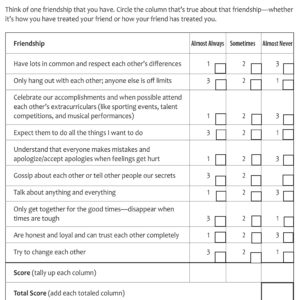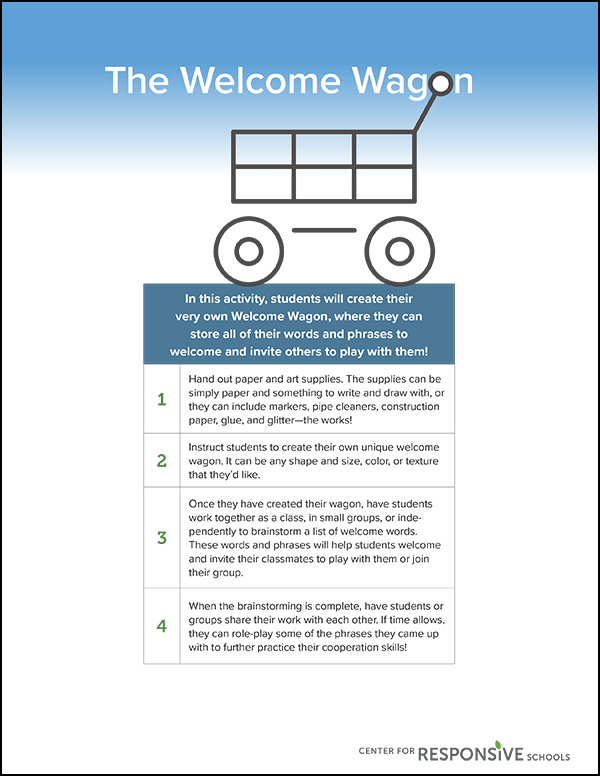Can you think of a time when you’ve met someone and you felt instantly familiar with them? You sensed a connection and quickly became fast friends. While those rare moments of synergy can feel fateful and exciting, they do not capture the full scope of how we make friends. The social-emotional competency of cooperation is a key skill that can be explicitly taught and procedurally learned to assist children in starting and maintaining healthy friendships (Elliott, Frey, & Davies, 2017). With the support of parents and teachers, students can be provided the concrete skills needed to develop prosocial behaviors and communication necessary for making friends and—just as importantly— being a good friend. With the knowledge and understanding of how to make and keep friends, students of all levels and styles of sociability can build a strong network of lasting friendships.
Why Are Friendships Important?
Friendships are vitally important for children’s happiness, well-being, and development, and the quality of their friendships can be predictive of happiness and success later in life (Hall, 2019). When interacting with friends, children build communication skills, learn to behave respectfully toward all peers, and practice negotiating a variety of social situations. Children with strong friendships tend to have better attitudes toward school, which, in turn, positively impact their academic performance (Ferrer & Fugate, 2014). When children understand how to form lasting relationships, they are growing a crucial aspect of their SEL skills. Cooperation and, more broadly, social competence are associated with a decreased likelihood of poor attitudes about school, avoidance, and underachievement (Shoda, Mischel, & Peake, 1990).
Creating the Right Environment
An important aspect of helping students make and keep friends is creating the right environment for friendships to form and fostering a classroom culture where friendships can thrive. This includes setting clear expectations for appropriate behavior, such as modeling respect for all other classmates and adults; creating and honoring boundaries of both peers and the classroom environment; and teaching students how to solve problems with words and active listening (Ferrer & Fugate, 2014). Student sharing in small- or whole group settings will help build connections as well. When students share aspects about themselves and their classmates respond with guided, thoughtful, and caring responses, they have opportunities to learn about each other and build a positive classroom community. This teaches students two important skills for forming trusting relationships: openness and empathetic listening (Vincent, 2020).
An important aspect of helping students make and keep friends is creating the right environment for friendships to form and fostering a classroom culture where friendships can thrive.
How to Make and Keep Friends
One of the most basic ways to encourage friendship is simply allowing children to spend time with each other. Giving children ample opportunities to play with other children through playdates and joining teams or clubs introduces them to many potential friends (Ferrer & Fugate, 2014). The way that children spend time together is also important to making friends (Hall, 2018). Before playdates or joining a new team or club, adults can give children direct instruction on how to interact with others, model appropriate behaviors, or practice their social skills through role-play (University of Connecticut, n.d.).
Consider the following skills and strategies for making friends:
- Welcome others to join in. Practice different strategies with students for inviting others to play with them or joining a group or a conversation. Role-play in class and use perspective-taking exercises to remind students how it feels to be left out.
- Show respect for everyone. Provide students with a vocabulary for interacting respectfully with their peers. For example, “Let’s” statements (“Let’s try a new game!”) and “May I” questions (“May I play with your cars too?”) (University of Connecticut, n.d.).
- Take turns. Taking turns is crucial for cooperation, reciprocation, and compromise—three essential aspects of a healthy friendship. Embed activities into the classroom that help students learn to take turns to teach them the importance of reciprocating and respectful waiting.
For maintaining friendships, consider the following skills and strategies:
- Value friends’ ideas. Remind students that friends don’t always need to agree on everything. Give them the skills to listen actively, consider what their friend is saying, and respectfully agree or disagree. Teach them to ask questions when they disagree with their friends, such as “Why do you think that?” or “Tell me more about …”
- Understand a friendship’s ups and downs. Help students understand that friendships take effort, trust, and good intentions. Listen when students talk about friendship problems, help them clarify the issue (“It sounds like you’re upset with your friend because …”), and then offer support as they seek a solution (Ferrer & Fugate, 2014). Encourage students to use “I” statements when something seems amiss in a friendship, and remind them how much they care about their friend.
- Accept constructive criticism. Remind students that friends want the best for their friends. When someone offers criticism, it can be hard to hear, and that’s okay. Encourage students to use mindfulness, such as taking two to three deep breaths before reacting, when dealing with the emotions that can accompany constructive criticism. Remind them that they can ask their friends for clarification while keeping in mind that their friend is looking out for them.
- Practice active listening. Remind children that having good friends means being a good friend. Demonstrate how to listen actively, with eyes on the speaker and proper body language, and have students practice in small groups (McCullough, 2019). Have students share how they can use these skills with their friends and talk about why it is important.
When we take time to teach students the social and emotional skills necessary to make and keep friends and integrate those skills into a supportive, caring environment, they will have many opportunities to form lasting relationships. This ensures that all students—regardless of whether they are shy, outgoing, introverted, or extroverted—are able to create dynamic, lasting friendships to help them succeed in and out of the classroom.

Download a Friendship Calculator, a tool that older students can use to evaluate a friendship and how their friends treat each other.

The Welcome Wagon activity will help students organize welcome words to help welcome and invite classmates to play with them or join in a group.
References
- Elliot, S. N., Frey, J. R., & Davies, M. (2015). Systems for assessing students’ social skills to achieve academic competence. In J. A. Durlak, C. E. Domitrovich, R. P. Weissberg, & T. P. Gullotta (Eds.), Handbook of Social and Emotional Learning (pp. 301–319). The Guilford Press.
- Ferrer, M. & Fugate, A. (June 2014). The importance of friendship for school age children (Report No. FCS2207). University of Florida/Institute of Food and Agriculture Sciences Extension. https://www.frontierdistrict.k-state.edu/family/child-development/docs/school-age/ImportanceFriendship.pdf
- Hall, A. (2019). How many hours does it take to make a friend? Journal of Social and Personal Relationships, 36(4), 1278–1296. https://journals.sagepub.com/doi/full/10.1177/0265407518761225
- McCullough, R. (2019, November 12). Strengthening students’ speaking and listening skills. Center for Responsive Schools. https://www.responsiveclassroom.org/strengthening-students-speaking-and-listeningskills/
- Shoda, Y., Mischel, W., & Peake, P. K. (1990). Predicting adolescent cognitive and self-regulatory competencies from preschool delay of gratification: Identifying diagnostic conditions. Developmental Psychology, 26(6), 978–986. https://depts.washington.edu/shodalab/wordpress/wp-content/uploads/2015/05/1990.PredictingAdolescent_Shoda.pdf
- University of Connecticut Center for Excellence in Developmental Disabilities. (n.d.) The importance of teaching friendship skills. Pyramid Toolbox (Issue 4). https://uconnucedd.org/wp-content/uploads/sites/1340/2016/06/Issue-4-Toolbox.pdf
- Vincent, K. (2020, February 19). Student sharing: A strategy for culturally responsive teaching. Center for Responsive Schools. https://www.responsiveclassroom.org/student-sharing-a-strategy-for-culturallyresponsive-teaching/
